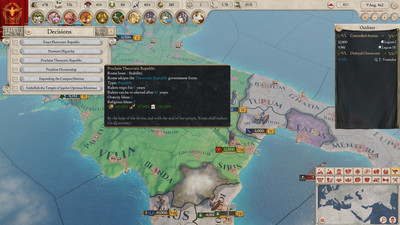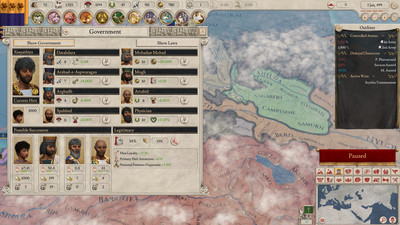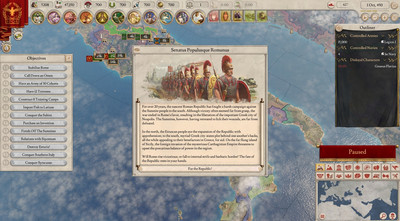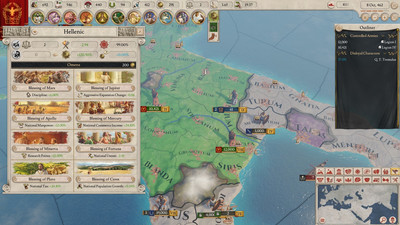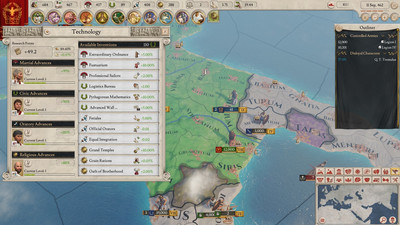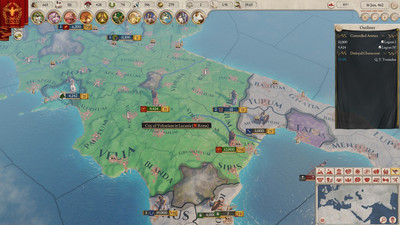| Site menu |
| Section categories | ||
|
| Chat Box |
3:51 PM Review Imperator : Rome | |
Tell any strategy fan the phrase “grand strategy from Paradox” and he will immediately understand what it is about: a huge colorful map, divided into thousands of small pieces - provinces, cities, countries - each of which can be fully managed, as well as an incredibly high threshold of entry. In the new game, the first remains unchanged, and the developers have tried to abandon the second. It turned out, unfortunately, only partly. The events of the Imperator: Rome unfold several years after the death of Alexander the Great. His empire is fragmented, the remnants of his people are fighting for power in different countries, and chaos reigns in Europe. But he is - eternal and mighty, not subject to time and adversity - Rome. A huge responsibility falls on the player’s shoulders: to create that great empire that we all know about from history textbooks. Rome is strong, but Rome is not easy. Everyone must reckon with his enormous military and financial strength, but it is not so easy to use it. Each decision must be approved by the Senate, and sometimes citizens become the main obstacle to this or that important decision. But as a rule, no one bothers to conquer neighbors, because few people are able to stand against the onslaught of the well-trained cohorts of the “eternal city”. Rome is a great choice for people who love to “paint” the map in one color. But for every Rome there is a Carthage. The Carthaginians have their advantages and disadvantages - even if the initial positions of this power look much more solid than the Roman ones, it is much more difficult for them to control every corner of their empire stretched across the whole of North Africa. But in general, who says that we need to fight for the powerful? Why not lead the fragmented tribes of northern Europe and not unite them on a continental scale? Or help the British people to unite Albion? Traditionally, you can manage all. But it is important to understand that not every ruler is destined to conquer the world. The developers offer several realistic development paths for each country in the “Solutions” submenu. They should be guided, as the path to their achievement invariably lies through the strengthening of power. Crusader Kings 2 - this can be said RPG among the "paradox" strategies. Great emphasis on characters and court intrigues provide an excellent help for wagering. Europa Universalis 4 is a game about conquering and repainting the card to your color. In Imperator: Rome, the developers tried to combine these two sides into one medal. It is worth noting that it turned out well: the mechanics who moved here from those two series do not look out of place. The stability indicator, for example, is one of the most important elements for which the rulers of large empires need to be followed, otherwise civil war cannot be avoided. The pieces into which the map is divided are no longer provinces; they are cities. And their number is staggering: more than seven thousand. Unfortunately, there are more historical flaws here. For example, Georgian (and then Iberian) Tbilisi as a city appeared only in the 5th century. But do not give it too much importance: the story itself is not too accurate science, and it is foolish to demand one hundred percent accuracy from the developer of computer strategies. Egypt after the death of Alexander remained virtually untouched from the outside, he was stifled by internecine feuds among the local and ruling remnants of the Alexander dynasty. The question arises: “What if I can resolve this issue?” The game gives me enough leverage for this. What then can prevent the mighty Egypt from trampling the rest of the world into the dirt? ” Will prevent the very device of Egypt. The main vital artery of the state - the great Nile - concentrated the whole life of the country around itself. The civilization of a snake winds along with every turn of a mighty river, the banks of which are fertile like no other place on earth. But the possessions of Egypt are not limited to the Nile Basin - the endless deserts around also belong to the state. And these lands, where the civilized Egyptian’s foot does not set foot, are home to barbarians, whose raids are the main problem of Egypt. The problem is that they cannot simply be taken and crushed by the Aki of the neighbor's Paw, who has splashed out on an elephant: their lands are impregnable and their harassment has to be tolerated. The stunning success of the space strategy of Stellaris made it clear that a functional tutorial is simply a basic necessity. But unlike “Stellaris”, here it is not integrated into the game itself, but is imposed by a separate regime. It sets fairly simple tasks, performing which the player gradually gets acquainted with the basics of power management. However, it can be misleading: Rome, which is given in the tutorial, is much stronger and richer than in the usual mode. Knowledge, which gives training, should be enough for the beginning of the party; then they should be replaced by experience. But the problem is that the interface Imperator: Rome is still very far from the intuitive. Sometimes it is difficult to understand for what reason it is impossible to make this or that decision, or which menu you need to open in order to find the necessary information. The unintuitiveness of the interface is also due to the fact that the set of elements is in essence the tables from Excel. A lot of numbers, a bunch of percentage bonuses to the indicators that should be searched in other tables, bonuses, fines. And all this must be known and remembered. And the whole interface, to put it mildly, is inconvenient and ugly: it would be better to replace the huge round icons with unobvious pictures with ordinary dies with stylized text, and the tooltips could pop up faster. Signs - a global bonus to the whole country - are decorated as a blessing of the gods. This moment is not very clear to me: why do I need a mystical shell for such a straightforward bonus, as for example, + 10% to the speed of learning technologies? The technology tree is also somewhat disappointing: almost the absolute majority of them give all the same notorious bonuses to tsiferkam, and something even a little bit interesting appears only deep in leyteyme. But the functionality of the trade is done as well as possible. All resources give different bonuses, and if needed, you can easily find the country from which you can import goods. Political relations with neighboring countries are extremely important, but it is equally important to try to establish relations with distant ones: exchange the wine that we have in abundance for elephants from distant lands, and then trample our enemies with them - it's worth it. Military gameplay in Imperator: Rome is good without any “but”. Large selection of units allows you to do as a specialized army under specifically taken tasks, and a huge multi-functional legions of death. Military gameplay is a game of maneuvers: it is extremely important to take strategic locations, block the path of the enemy, force him to engage in an unequal and unfavorable battle. Each cohort has several tactics available: each has its own pros and cons, useful properties and windows for use. For example, heavy spearmen in a defensive formation will incur the smallest amount of losses against the standard build of the enemy, but if he applies the tactics of shocking attacks and retreats, then at the cost of considerable losses he will be able to disassemble this armored turtle. It is crucially important to always maintain the morale of soldiers at the proper level: even the advantage of several thousand people does not mean anything when the army is demoralized and not ready for battle. You should not give too much power to any single general, because each new victory over the enemy can generate a new - more formidable and more dangerous - from the inside, an opponent for the throne. The game looks quite good, despite the antiquity and dilapidation of the engine. Geographical details have become closer than ever to reality, and a huge number of different map options allow you to monitor the necessary parameters. But just like Stellaris, Imperator: Rome can start to suffocate in mid-leithheim: the amount of computation simply reaches cosmic scales and allows even top processors to sweat. | |
|
| |
| Total comments: 0 | |
| Log In |
| Search |
| Calendar |
| Site friends |

